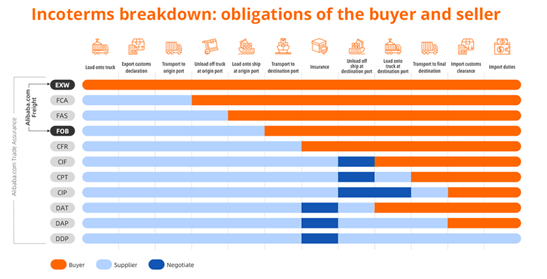Logistics Incoterms That Frequently Used In The Industry

Emrullah Yaşar
Sales Executive
What is Incoterms?
Incoterms are one of the forms used in foreign trade. These terms specify obligations between exporters and importers and it’s a common mistake that Incoterms means nothing more than standard contract terms could be revised at any time by exporter and importer.
In this overview, the terms are arranged according to the balance of obligations between exporter and importer;
“EXW represents the minimum obligation, and DDP the maximum obligation for the seller.”
This is the way the Incoterms were presented in 1990 and 2000, As a forwarder, we organize the invoice and operation according to the incoterm information we receive from the buyer or the seller, as we have stated before, these obligations can be changed as requested.

The most used incoterms are as follows;
EXW (Ex Works)
EXW represents the minimum obligation for the seller (as opposed to DDP) The seller fulfills his obligation to deliver when he places the goods at the disposal of the buyer at the seller’s premises or at another named place
FOB (Free On Board)
The seller delivers the goods in the manner customary at the port of shipment, and if there are no port customs, by placing them on board the vessel . Whereas FCA refers to ‘loading’, the FOB-term uses the term ‘placing’. The seller also clears the goods for export. The buyer organizes the main international transport,
CFR (Cost and Freight)
CFR equally has two ‘critical points’. Delivery, and thus passing of risk, occurs in the port of departure, when the seller places the goods on board the vessel (as in FOB). On the other hand, the seller pays the freight until the port of destination. In other words, sea carriage is for the account of the seller, but occurs at buyer’s risk.
DAP (Delivered At Place)
DAP means that the seller delivers when the goods are placed at the disposal of the buyer on the arriving means of transport, ready for unloading, at the agreed place of destination. Import duties and formalities have to be conducted by the buyer
Reference




